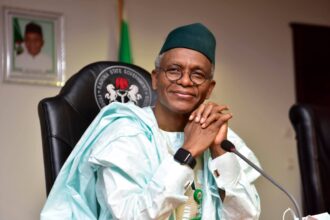The Human Rights Writers Association of Nigeria (HURIWA) has chastised President Muhammadu Buhari for his reluctance to sign the reworked Electoral Act Amendment Bill, claiming that his intentions are self-serving rather than nationalistic and patriotic.
According to HURIWA’s National Coordinator, Emmanuel Onwubiko, the President’s intransigence and refusal to sign the Electoral Act is as bad and evil as military coups in Guinea Bissau, Mali, and other West African countries.
ATTENTION: Click “HERE” to join our WhatsApp group and receive News updates directly on your WhatsApp!
While condemning the President for traveling the world at a time when a critical task was at hand, the group claims Buhari’s refusal to sign the Electoral Act is a calculated attempt to undermine and sabotage the transparent conduct of the 2023 general election.
Buhari had asked the National Assembly in December 2021 to remove the direct primaries clause from the Electoral Act Amendment Bill.
The President, in a letter to the Senate, asked the National Assembly to remove the contentious clause on direct primaries from the bill and return it to him for assent.
The National Assembly sent the reworked bill to the President for assent on January 31, 2022.
Buhari then forwarded it to Abubakar Malami (SAN), Minister of Justice and Attorney General of the Federation, for legal advice.
Malami had hinted that if he found the reworked bill to contain proposals based on personal interests, he would advise the President to withhold assent.
The President has yet to sign the reworked bill, despite the fact that it was sent to him by the National Assembly 20 days ago.
The President is required by law to respond to the National Assembly’s proposal within 30 days of receiving it.
The bill was delivered to him on January 31, 2022, giving him only 10 days to act on it. In the last five years, the President has rejected five electoral amendment bills.
Prof. Mahmood Yakubu, Chairman of INEC, stated last month that once the bill is signed by the President, the commission will quickly release the timetable and schedule of activities for the 2023 general elections based on the new law.
HURIWA, in a statement, said the President’s body language during the assent of the Electoral Act betrays his many rhetorics that he will leave a legacy of democratic values and tenets in Nigeria when he leaves office in 2023.
According to the group, the President’s delayed assent is an “attempt to destabilize democracy because constitutional democracy runs seamlessly in an atmosphere of certainty and legality.”
“But what President Muhammadu Buhari has done with his blatant failure to sign the Electoral Act is to put democracy in jeopardy and make it appear that the country isn’t ready for free and fair elections,” HURIWA added.
His refusal strikes at the heart of the legislature’s constitutional independence and jeopardizes the principles of checks and balances enshrined in the constitution.
“Already, 26 civil society organizations have decided to stage a protest on Tuesday if the President fails to assent to the bill within two days.” The President must immediately sign the Electoral Act, or Nigerians should consider civil disobedience actions such as street protests to compel the President not to jeopardize next year’s election.”
Raymond Dokpesi Seems To Be Working For APC – Wike

